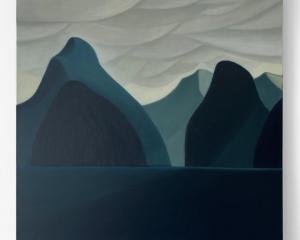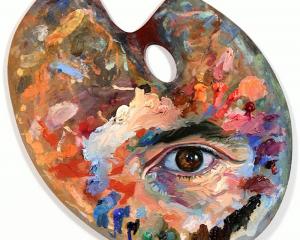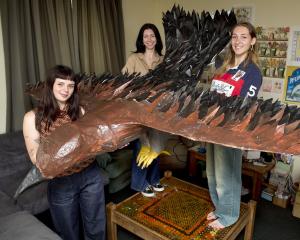In 1973, a year after publication of Lady Moss Revived - a first book of poems by Dunedin poet Peter Olds - Otago Daily Times reporter John Gibb, then literary editor of the Otago University Students Association newspaper Critic, interviewed him about his writing, for the student newspaper. This year, Cold Hub Press published You Fit the Description, a large selection of Olds' work. And Gibb went back and asked Olds a few more questions, including about the importance of dreaming in his life and work.
Former University of Otago Burns Fellow Peter Olds has always been a ''big time'' dreamer, he says with a smile.
Born in Christchurch in 1944, the son of a Methodist minister, Olds was educated at Seddon Memorial College in Auckland, but had earlier spent much of his early life in the South Island, including at Milton.
Back in his school days, teachers sometimes took issue with him, including in his report cards, for being something of a ''dreamer'' in class.
But since having published 10 longer books of poetry - including two volumes of ''Selected Poems'' - and also having been the inaugural winner of the Janet Frame Literary Trust Award for Poetry in 2005, Olds could be forgiven for feeling vindicated over that earlier habit of dreaming.
And he hasn't left that habit completely behind, but ''I don't dream the way I used to''.
''If they called you a dreamer at school, it was a put down.''
School was ''just a bad memory'' and he was ''very miserable all the way through school'', also experiencing glandular fever and some other personal challenges.
''I was just one of those kids that got left behind.''
As an adult, it was ''OK to dream about building a garage'', but it was a different story as a boy at school, when, sometimes, the dreaming was ''more of a way of escaping the classroom''.
''It started well before the writing. It's just a natural sort of thing.''
And he also found, even as a youngster, that he had something of an artist's way of seeing the world, and ''wanted to be something special''.
Many of his ideas had started as dreams but needed work to realise them.
''Dreams don't work if you don't work.''
After leaving school, he soon proved himself a hard and capable worker in several fields, training initially as a window dresser.
And even, at one point in the late 1970s, he worked part-time as a fast-moving night cleaner at Dunedin's University Book Shop - activities that he memorably captured in his poem Thoughts of Jack Kerouac - & other things.
Even as a youngster he had been ''reasonably careful'' not to dream of doing the completely impossible, and was always prepared to put in the hard work, as well as the creativity, to make things happen.
Over the years, the dreaming took various forms.
At one fairly early stage, he read an anthology and dreamed of getting some poems included there.
''And then I got some poems published in an anthology.''
Sometimes his poems are built on drafts or even briefer notes written years earlier, but he has always been able to remember some key moments from the past in vivid visual detail.
''I see the stuff I dream.''
And some of his most powerful poems involve visually strong recollections, including of past family links, and his late father.
As Olds' early interest in writing developed, a meeting with the late poet James K. Baxter, in Dunedin in the 1960s, through his daughter Hilary, proved significant and grew into a close friendship.
Olds had previously tended to think of poets as English folk wearing tweed jackets, and perhaps living in big country houses.
Baxter was not completely unlike the stereotype, in that he did wear, at times, tweed jackets and corduroy trousers.
The Robert Burns Fellow in 1966 and 1967, Baxter was also a New Zealander and took a genuine interest in the emerging younger writer and his poetry.
''What he was writing was more accessible,'' Olds adds.
For many years, particularly in the 1970s, Olds alternated between living for periods in Auckland and then in Dunedin, a city where he came to feel increasingly at home.
And the sometimes harsh Dunedin winters appealed to him strongly, drew him back south, and repeatedly fired his imagination.
Southern winters were dark, with ''something beautiful'' about them.
''It's still my favourite time of the year, the Dunedin winters, when the days get shorter - shorter days and longer nights.
''Things stand out more. The trees stand out more.''
And he conjures up an image of a time ''in the middle of winter, with grey sky and thin black wet trees and the dark background''.
''When I went up North, I hardly did any writing at all. I'd do all my writing in Dunedin.''
After the recent publication of his selected poems by Cold Hub Press and its editor Roger Hickin - a former Dunedin resident and also a poet, translator and visual artist - Olds is already starting to dream about his next likely project, another book of poems.
Despite his literary success, he never takes his writing for granted.
He knows this often involves hard work, and recalls a 16-year gap when he had no books published, before Music Therapy appeared in 2001.
''I've had a lot of stops and starts.''
But the dreaming still goes on.
WINTER LOVE
Friends up north
when I told them I'd
be travelling south for winter
said I was mad.
Now, looking over the North
Ground Park, watching
the rugby poles bend slowly back
from wind, slush and man,
I see what they only dream:
ice-edged gulls cornering overhead
floating through frost
and coal smoke; mountain -
black oak trees
snoring through grey-sleet storms -
storms that drive the beaten
to bottle and pooltable bar
to lean on the shoulderof a black-haired girl ...
Yes, friends up north,you do have a point.
You have your warm wet humidity,and I
my snowcapped stupidity.
Have you ever had a frozen cat
love you for nothing?
- Peter Olds












